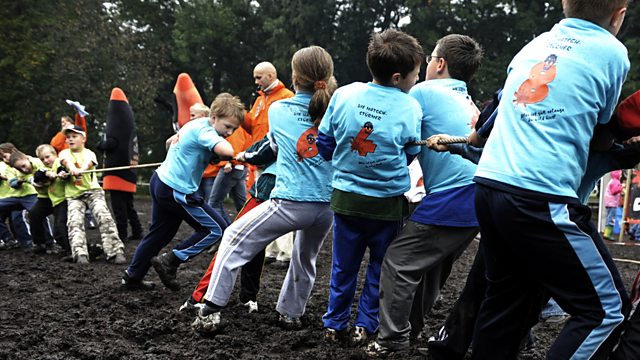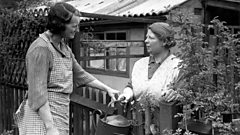Us and Them
Do you see the world in terms of 'us and them'? Why divide ourselves into two camps - is what separates us really stronger than what unites us?
Is it helpful to view the world as being divided along fault-lines of gender, class, race or religion? Matthew Taylor talks to anthropologist Laura Nader, who says we need to find new dialogues between the West and the Middle East that recognise our common humanity; historian David Cannadine who says that as well as studying conflict, we should explore our undivided past; and novelist Aminatta Forna, who examines the aftermath of civil war through her fiction; what about when 'them' also means 'us'?
Image: Children playing tug-of-war, Credit: Jens-Ulrich Koch/AFP/Getty Images
Last on
Clip
Chapters
-
David Cannadine
Duration: 14:00
Laura Nader
Duration: 09:00
60 second idea – Anonymous for a Day
Duration: 04:14
Aminatta Forna
Duration: 13:16
David Cannadine
![David Cannadine]()
British historian David Cannadine, currently Dodge Professor of History at Princeton University, argues that is one that has not been explored enough by historians, politicians or journalists. He believes that the attention given to conflict and clashes in human history has drowned out the parallel examples of conversation, co-operation and co-existence. He also suggests that to ask people to privilege just one of their identities, such as gender or class, over all their other identities, is divisive and damaging. Photo by Tom Miller
Laura Nader
![Laura Nader]()
Laura Nader is Professor of Social Cultural Anthropology at the University of California at Berkeley. She describes herself as culturally in-between; growing up in the USA with Levantine parents, her eyes were opened to the history, literature and politics of both East and West, and this is something that she draws upon in. The book calls for a complete re-framing of dialogues between the West and the Middle East. She says that if we are ever to reach a position of mutual respect, we need to address our preconceptions and be open to learning about the culture of the Other.
Aminatta Forna
![Aminatta Forna]()
Writer Aminatta Forna has set previous books in her own country of Sierra Leone, but in a new novel , she chooses to explore the aftermath of civil war in the Balkans, through its effects on a small group of friends in a Croatian hill town. She is interested in the seemingly small acts of betrayal that take place between neighbours, friends and even family, when they have to decide which side they are on. She says that for people who have survived a civil war, forgiveness is always possible, but forgetting is another matter.
60 second Idea to Change the World
Aminatta Forna would like everyone to dress up in a full body suit for a day every month…one that covers every part, including the head and the face. This would be a return to the era of masquerade when people shed their inhibitions in the spirit of carnival. We would be released from our conformity and the expectations of others, as there would be no social markers, no colour, no old or young, no cliques or tribes. Anonymity would allow us to give free rein to our imaginations; we could be exactly who we want to be, and we would all be happier as a result.In Next Week's Programme
Silence: Is it a route to better communication? With American planetwalker John Francis, Russian Komi artist Galya Morrell and Scottish historian Diarmaid MacCulloch.
Comments on the Programme
"Us and Them" is a topic that I start my classes with at the beginning of each term now (biology classes). I base it on the writings of Plato in his book The Republic, titled "The Analogy of the Cave." Essentially, I make the point that we are all in the so-called "cave" together. Whether we become spelunkers (just visiting the cave) or troglodytes (compelled to live in the cave) is up to each of us, and there is only "us." That is, whether we choose to become enlightened or not, about the global issues we face, is really a choice we make. It is very moving to see some students realize, as they watch, that their education should be life long lest they become a troglodyte. Keep up the good work!
Anthony Curtis
Humans are best at coexistence because they are a part of nature which simply is unity in diversity. The problem is humans are not in sync with nature and we live in a subjective synthetic world steered by trying to eliminate the other to have it all.
Mwangi Gitau
Broadcasts
- Sat 27 Apr 2013 23:05GMT����ý World Service Online
- Sun 28 Apr 2013 10:05GMT����ý World Service Online
- Mon 29 Apr 2013 02:05GMT����ý World Service Online
Podcast
-
![]()
The Forum
The programme that explains the present by exploring the past






